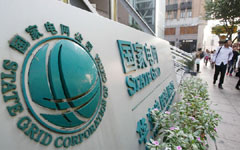Ongoing urbanization and the battle with smog pollution in China has created a huge market for generating heat from industrial waste that has attracted foreign investment and technology.
"China's market for industrial waste heat recovery and utilization is maturing faster than it was three years ago when we started such projects," said Wu Song, executive director of China Operations with Johnson Controls Inc's Building Efficiency Business.
|
 State Grid gets Australian permit for investment
|
|
 |
As a global multi-industrial company with established core businesses in the automotive, building and energy storage industries, Johnson Controls is focusing on China's waste heat industry. Its billions in market value is "hard to calculate specifically", Wu said.
In 2013, the company signed contracts in China totaling about 200 million yuan ($32.4 million), helping power plants and companies in the oil, mining and coal chemical industries to reuse waste heat.
Wu said Johnson remains in the initial stages in terms of the deal's value and project numbers, but it will boom because China is putting great emphasis on saving energy and cutting pollution to improve air quality.
"The company has brought technology along with the R&D center to China to better fit the market demand," he said.
At present, the company runs more than 20 projects in China, five in the oilfields sector, according to Hao Li, a manager of Johnson Controls' Building Efficiency operations in Northern China. The country comprises about 10 percent of global revenue at the company's BE unit.
Demand is huge in the market, and many foreign companies are seeking opportunities.
"We have the confidence to be the leader because we know the market well," Hao said. "We see many US companies with related technology wanting to come to China. They are either developing products for the market or doing research to decide their direction."
He said the trend is for thermal power plants to become the major heating provider in urban China against a background of energy-saving policies. Future plants will be more centralized and larger, providing more than half the heating for urban use compared with around 30 percent currently, Hao said.
To encourage energy conservation and cut waste, Beijing local government offers 50 percent subsidies to companies using new-type heat pumps, according to Johnson Controls.
